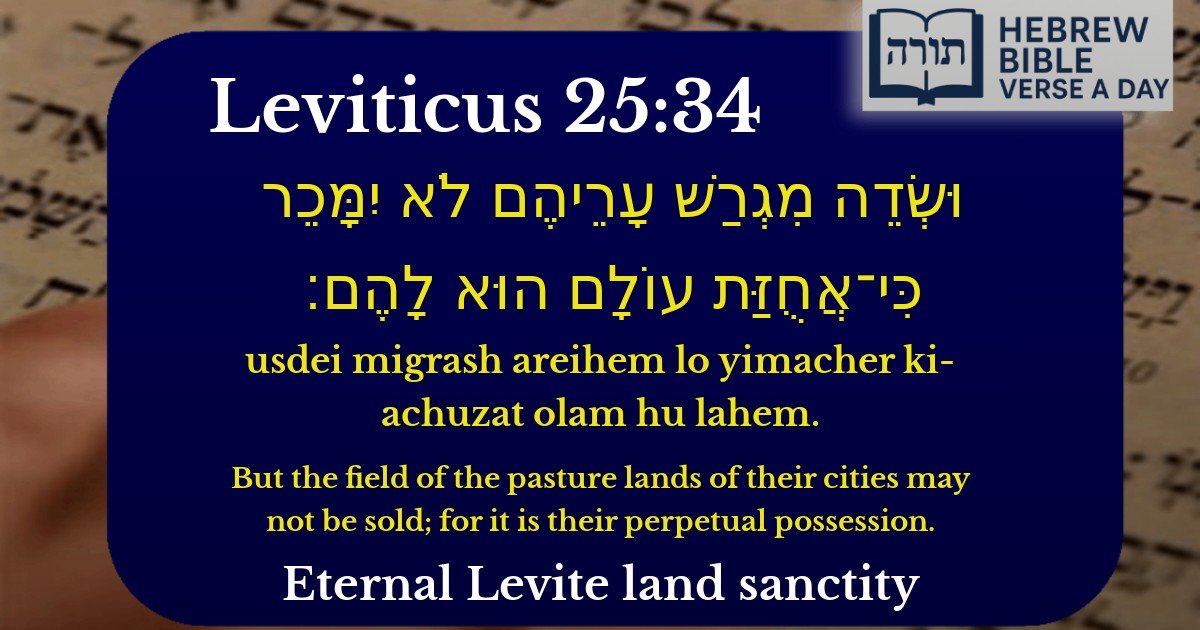Join Our Newsletter To Be Informed When New Videos Are Posted
Join the thousands of fellow Studends who rely on our videos to learn how to read the bible in Hebrew for free!
Hebrew Text
וּשְׂדֵה מִגְרַשׁ עָרֵיהֶם לֹא יִמָּכֵר כִּי־אֲחֻזַּת עוֹלָם הוּא לָהֶם׃
English Translation
But the field of the pasture lands of their cities may not be sold; for it is their perpetual possession.
Transliteration
Usdei migrash areihem lo yimacher ki-achuzat olam hu lahem.
Hebrew Leining Text
וּֽשְׂדֵ֛ה מִגְרַ֥שׁ עָרֵיהֶ֖ם לֹ֣א יִמָּכֵ֑ר כִּֽי־אֲחֻזַּ֥ת עוֹלָ֛ם ה֖וּא לָהֶֽם׃ <span class="mam-spi-samekh">{ס}</span>
וּֽשְׂדֵ֛ה מִגְרַ֥שׁ עָרֵיהֶ֖ם לֹ֣א יִמָּכֵ֑ר כִּֽי־אֲחֻזַּ֥ת עוֹלָ֛ם ה֖וּא לָהֶֽם׃ {ס}
🎵 Listen to leining
Parasha Commentary
📚 Talmud Citations
This verse is quoted in the Talmud.
📖 Arakhin 33b
The verse is cited in a discussion about the laws concerning the sale of fields in the cities of the Levites, emphasizing that these fields cannot be sold permanently as they are an eternal possession.


Context in Leviticus
The verse (Vayikra 25:34) appears in the context of the laws of Yovel (Jubilee), which mandate the return of ancestral lands to their original owners every 50 years. This specific verse addresses the unique status of the pasture lands belonging to the Levite cities.
Rashi's Explanation
Rashi clarifies that this prohibition against selling the pasture lands of Levite cities stems from their unique role in Israel. Unlike other tribes who received agricultural land, the Levites were given cities and surrounding pasture lands (Bemidbar 35:1-5) as their inheritance since their primary role was Divine service in the Mishkan and later the Beit HaMikdash.
Rambam's Legal Perspective
In Hilchot Shemittah V'Yovel (13:5), the Rambam rules that this prohibition applies even during times of financial distress. The pasture lands must remain permanently available to the Levites to support their livestock, which were essential for their livelihood and Temple service.
Talmudic Discussion
Midrashic Insight
The Sifra connects this law to the broader principle that the Levites' inheritance was different from other tribes. While others had land that could be temporarily sold (with return at Yovel), the Levites' pasture lands were completely inalienable, reflecting their complete dependence on Hashem.
Practical Implications
This law ensured that: